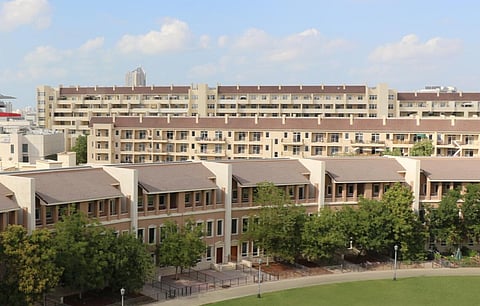Green Initiatives & Climate-resilient Solutions Crucial for Real Estate Sector
In an era where climate change has become a major concern, the Real Estate sector is rebalancing its trajectory to ensure long-standing resilience. By emphasising both risk evaluation and mitigation, innovative strategies can be devised that strengthen investments against the escalating challenges posed by changing climate conditions.
This involves leveraging resilient design and advanced technologies. However, constructing resilient homes alone cannot address all the issues at hand, it further necessitates a re-evaluation of the approach to climate management.
Climate management involves strategies and ‘Green Initiatives’ for individuals and organisations to implement resilient measures. Real Estate professionals assess environmental risks in specific locations by reviewing past climate data, identifying sensitive areas, and calculating the likelihood of encountering extreme weather events.
Designing structures to withstand and adapt to changing climate conditions includes using materials resistant to extreme weather, elevating buildings to reduce flooding, and incorporating natural ventilation systems, among other measures.
With green initiatives being an integral part of climate management, its integration in Real Estate development, contrary to common perception, offers more than just environmental benefits. Integrating sustainable practices into Real Estate development attracts businesses, talent, and investment, thereby driving economic growth and competitiveness.
However, a sustainable environment can only be achieved through active collaboration between the government, developers, and stakeholders.
Considering the rise in the need for sustainable and green practices in the Real Estate sector, His Highness Sheikh Mohammed bin Rashid Al Maktoum, Vice President and Prime Minister of the UAE and Ruler of Dubai, unveiled the Dubai 2040 Urban Master Plan in March 2021, outlining a roadmap for sustainable urban development.
The plan aims to double green spaces and parks, with nature reserves making up 60% of the emirate's total area. The UAE Cabinet approved the UAE Green Agenda 2015-2030 in January 2015, providing a comprehensive framework for Green Economy initiatives.
Expo City, as a result of these initiatives, has set interim goals to reduce its operational carbon footprint by 45% by 2030 and 80% by 2040, targeting net-zero status by 2050. Expo City is dedicated to reducing embodied carbon by 40% in construction materials by 2030 and achieving complete carbon neutrality by 2050.
Additionally, 80% of Expo 2020-built infrastructure, including 123 LEED-certified buildings (seven Platinum, 105 Gold, nine Silver, and two certified), will be retained, reflecting a commitment to sustainable urban advancement.
Apart from initiatives to reduce carbon footprint, another aspect of the confronting climate change is the development of sustainable cities. These cities make a positive difference in addressing climate change, resource scarcity, and environmental degradation.
As urban development contributes to 39 per cent of carbon emissions globally, 28 per cent being from properties and 11 per cent from construction, the implementation of green initiatives in real estate development is bringing numerous environmental benefits, including reduced carbon emissions, enhanced energy efficiency, and improved water conservation.
These efforts are crucial as sustainable cities contribute to social well-being, promote a sense of community, and elevate the overall quality of life.
With regard to the importance of effective green initiatives, the incorporation of green infrastructure and sustainable development principles within the Real Estate sector is a fundamental strategy aimed at mitigating environmental impact and fostering long-term ecological preservation.
Additionally, innovative technologies and data-driven solutions play a crucial role in strengthening climate resilience within the Real Estate sector. By leveraging such innovative technologies, Real Estate professionals can proactively address climate challenges.
In light of the changing trends in the Real Estate sector across the globe with sustainability standing as a top priority, the UAE has enacted a comprehensive array of initiatives, laws, and regulations to enhance sustainability within the sector.
Led by the UAE government’s net-zero strategic initiatives, this comprehensive approach includes reducing carbon emissions, overseeing energy usage in buildings, reducing water wastage, and limiting global temperature rise to 1.5°C.
A pivotal legal framework established by the UAE, the Federal Law No 24 of 1999 on the Protection and Development of the Environment, mandates organizations serving as project operators to obtain an environmental license or permit from the Federal Environmental Agency before initiating any project.
Moreover, the UAE’s hosting of the 2023 United Nations Climate Change Conference (COP28), has demonstrated the country’s commitment to addressing the prevalent issues of climate change and devising strategies along with other participant countries to ensure a climate-resilient future.
The conference made history when nearly every country unanimously committed to transitioning ‘away from fossil fuels’, the primary catalyst of climate change, as well as agreed to triple renewable energy and increase climate finance for the most vulnerable.
This marked the first time in 28 years of global climate negotiations that such an agreement was reached. This unprecedented achievement, applauded by experts, decision-makers, and environmental advocates, including COP28 president Dr. Sultan Al Jaber, signifies a determined step towards realising the Paris Agreement's 1.5°C target.
The agreement is embedded within the inaugural ‘global stocktake’, designed to assess and expedite the collective efforts of countries in attaining the objectives outlined in the landmark Paris Agreement.
The conference also incorporated crucial scientific insights from the World Meteorological Organization (WMO) and advocated increased adaptation financing. This included the implementation of Early Warnings for All, forming part of a comprehensive strategy to address the diverse challenges posed by global-scale climate change.
Additionally, several key initiatives were introduced, including the declaration on climate and health as well as recognition of the role of nature-based solutions in biodiversity conservation.


